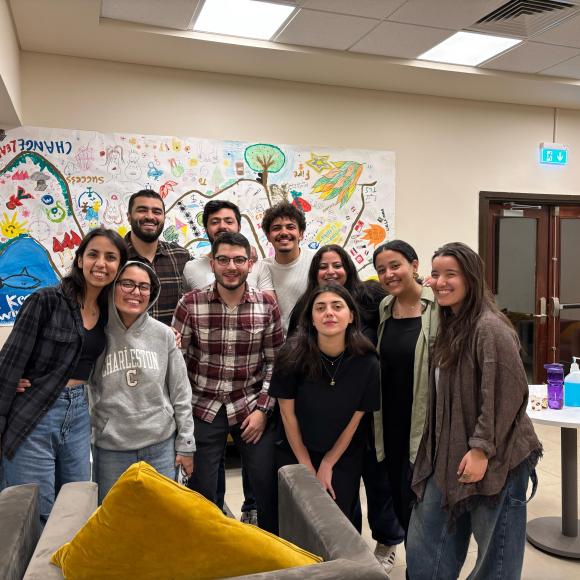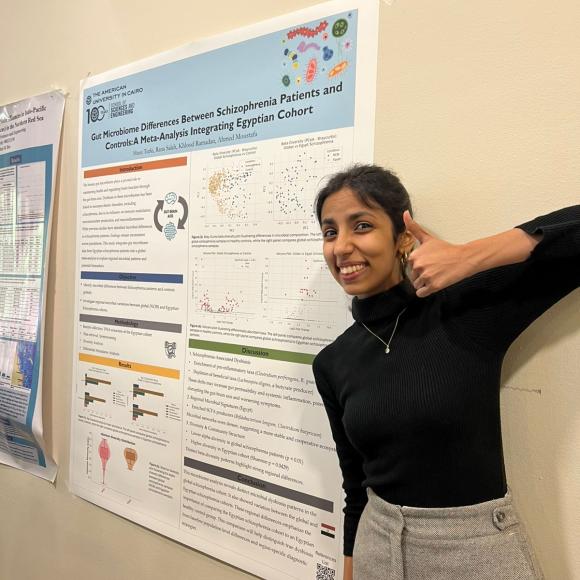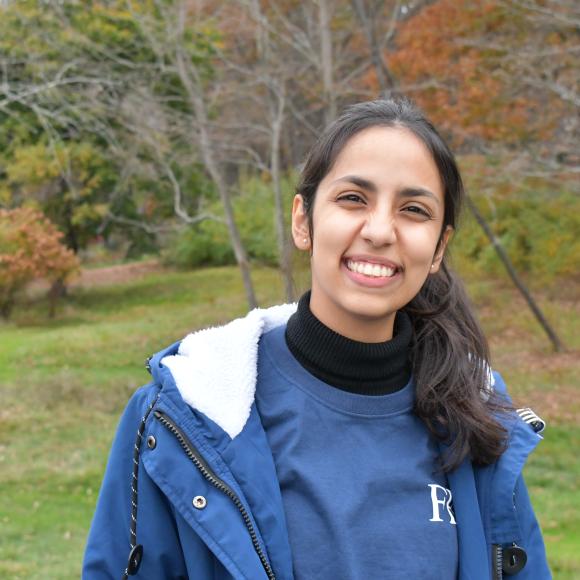
Island Stories: Hana w Surur in Rawda and Manial
Explore Manial’s entertainment heritage through maps, films and stories as part of Hana w Surur, a six-month community-based workshop program.
An international student from Yemen, biology senior Husn Turki described her AUC experience as “surreal,” offering unparalleled opportunities in the region. She was excited to be selected as the June 2025 undergraduate commencement speaker.
“It’s a really big deal, not only for my family but also for the whole community that I’m from,” said Turki about graduating from AUC and being the undergraduate class representative for the upcoming commencement.“AUC is where I lived for the past four years, not just where I got my education. I’m really proud and happy to be graduating; it’s such a milestone.”
Turki attended the University on a full ride as a Tomorrow’s Leaders Scholar. While at AUC, she conducted research under Professor Ahmed Moustafa, chair of the Nancy Hopkins Department of Biology, and studied abroad at James Madison University in Virginia. Turki also volunteered with a refugee resettlement NGO based in Denver, Colorado while abroad, translating for refugees.
“That was the main message of my speech: feeling grateful as a graduate of this institution but also acknowledging our potential. We have so much as AUCians; we should choose to direct ourselves toward doing good.”
Coming from Yemen, Turki recalled seeing people around her, including her family and community, struggle. Yet, they provided her with support to be able to travel by herself and have extraordinary experiences. “I feel the need to share my story and be grateful to my family. At the same time, I really want to talk about how this institution gave me so much,” she said. “I learned a lot, both as a Tomorrow’s Leaders Scholar and an AUCian.”
To Turki, being at AUC has been both a privilege and a responsibility; it is an opportunity that allows students to create a positive impact in their communities. “That was the main message of my speech: feeling grateful as a graduate of this institution but also acknowledging our potential. We have so much as AUCians; we should choose to direct ourselves toward doing good.”
One of the highlights of Turki’s undergraduate experience was her research, which is the first of its kind in Egypt, focused on the neuro-psychiatric microbiome. “We are studying the connection between the gut and the brain by studying the microbiome profile of people who have schizophrenia and bipolar disorder. We’re comparing to see if there is a link between the material that lives inside of us and the brain,” said Turki.
While the research is still underway, Turki speculates that the results could potentially be used to develop a diagnostic signature or even personalized treatment to enrich healthy bacteria and deplete harmful ones.
“[AUC] covered every single aspect, even the flights home, which I did not expect at all. I felt like the institution actually cares about me.”
Turki hopes to publish the research, which her thesis supported, and she will continue to serve on the research team even after graduating. “Being part of the AUC biology department gave me the chance to participate in advanced research, learn from the process and, hopefully, get published eventually.”
Turki’s dream is to become a professional researcher, and she hopes to eventually apply for graduate school to complete a degree in bioinformatics.
Turki shared some of the highlights of her time at AUC, starting with the scholarship program she is part of. “As a Tomorrow’s Leaders Scholar, I felt so lucky because I got to be among such incredible, inspiring members of the community who come from different parts of the region to live this journey together as a cohort,” said Turki.
The scholarship, offered by the U.S. Department of State, provides a full ride to competitive students from select Arab countries and territories to study at AUC or American universities in Lebanon. “I feel connected to my cohort,” said Turki. She is even in touch with the Yemeni Tomorrow’s Leaders Scholars who completed their studies in Lebanon over the past four years.
Another component of the scholarship is the ability to study abroad at a university in the United States. At James Madison University, Turki said, “I felt so amazed by the fact that anyone can be part of research as an undergraduate. You don’t have to be a senior or have much experience.”
When asked about her favorite memory at AUC, Turki brought up an emotional and turbulent moment that shook the whole University but left a particularly lasting impact on her.
“When the Tomorrow’s Leaders Scholarship funding was paused by the U.S. government for two months, AUC actually decided to cover us completely,” Turki said. “We didn’t know what was going to happen and AUC stepped in and said, ‘We’re gonna cover you for everything, fully. You don’t have to worry about tuition. You don’t have to worry about anything.’”
Turki described the moment as surreal and full of bliss. “They covered every single aspect, even the flights home, which I did not expect at all. I felt like the institution actually cares about me.” Despite the challenge of the moment, AUC’s reaction — taken with care and prioritization of its students top of mind — is what Turki deems to be her best moment at AUC.






Following two days of high-level dialogue and expert analysis, the inaugural IMF MENA Economic Annual Research Conference co-organized by the International Monetary Fund and AUC, concluded with a strong call for coordinated, evidence-based policy responses to the region’s old and new pressing economic challenges.
Held on May 18–19, 2025, the conference served as a critical platform for advancing rigorous research tailored to the realities of the Middle East and North Africa. It brought together global policymakers, academics, government officials and thought leaders to bridge the discussion on global economic issues with regional realities. The event marked a first-of-its-kind collaboration between the IMF and a leading University in the region, reflecting a shared commitment to deepening the link between academic research and policy development.
"This is about generating ideas that are globally informed but deeply rooted in the realities of our region."
Jihad Azour, director of the IMF’s Middle East and Central Asia Department, noted that trade tensions and increasing uncertainty affecting the global economy, alongside ongoing regional conflicts and climate risks, are creating new layers of complexities for MENA policymakers. Azour called for building a regional platform for dialogue and exchange of ideas that connects MENA to world-class research centers to provide reliable analysis and develop workable and innovative policy responses to old and new economic issues facing the region. “We are deeply grateful to President Ahmad Dallal and AUC for their commitment to fostering dialogue, research and policy innovation in the region,” Azour said.
AUC President Ahmad Dallal highlighted the event’s role as a vital platform in fostering collaboration between governments, academia and the private sector. "This is about generating ideas that are globally informed but deeply rooted in the realities of our region," Dallal noted.
Dallal affirmed that this type of multi-stakeholder engagement is at the heart of AUC’s mission and reflects the University’s commitment to research, education and open dialogue as drivers of stability, resilience and inclusive growth.
“We are deeply grateful to President Ahmad Dallal and AUC for their commitment to fostering dialogue, research and policy innovation in the region."

Under the theme “Steering Macroeconomic and Structural Policies in a Shifting Global Economic Landscape,” discussions centered on four pivotal issues shaping the future of the MENA region and the global economy:
Throughout the sessions, there was a clear consensus that the MENA region’s economic resilience depends on institutional reforms, cross-border cooperation, and investment in skills and innovation. Participants also underscored the importance of embedding policy in local realities — an approach that both the IMF and AUC pledged to champion moving forward.
In addition to prominent global and regional academics, as well as economists and government officials from across the region, and representatives of international and regional organizations, the conference brought together policymakers, including Egypt's Minister of Planning, Economic Development and International Cooperation Rania Al-Mashat '95; Youssef Boutros-Ghali, member of the Specialized Council for Economic Development; Mahmoud Mohieldin, United Nations special envoy on financing the 2030 Sustainable Development Agenda; and Martin Galstyan, governor of the Central Bank of Armenia.
As Nigel Clarke, IMF deputy managing director concluded, "This conference is a milestone demonstrating the IMF's commitment to deepening engagement with the research and academic community, as we strive to ensure that the IMF support is not only responsive to the needs of member countries, but also built on rigorous tested analytics and importantly, it's aligned with local realities. Through this kind of multi-stakeholder dialogue, we aim to better understand how all our expertise and resources can be directed towards the most pressing challenges of the region.”
Visit the conference website for more details and to watch Day 1 and Day 2 of the discussions.

Mahmoud Mohieldin, United Nations special envoy on financing the 2030 Sustainable Development Agenda; Egypt's Minister of Planning, Economic Development and International Cooperation Rania Al-Mashat '95; and Youssef Boutros-Ghali, member of the Specialized Council for Economic Development
